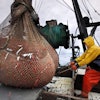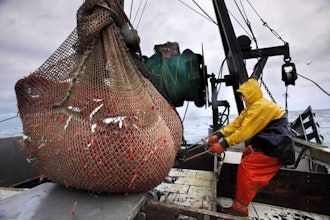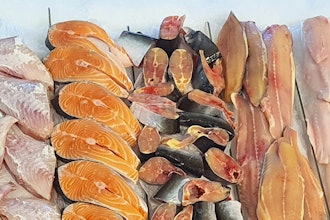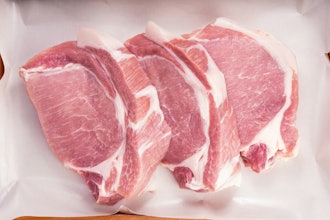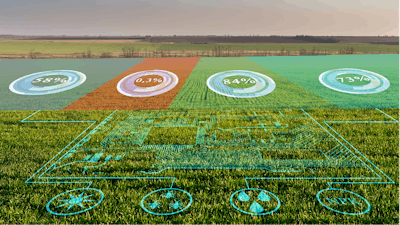
The COVID-19 pandemic has underscored the urgent need to create a more secure, safe and sustainable global food system. A growing population, increasing land degradation and high food waste have made food security an urgent global issue. Multiple disease outbreaks, like E. coli and African Swine Fever, in the supply chain over the last decade have led to rising skepticism among consumers about the safety and resilience of the food supply chain. The food sector is a major source of greenhouse gas emissions (GHGs), accounting for more than one-third of total GHGs, so developing a sustainable food system has become critical for governments, businesses and consumers.
On the production side of things, agricultural land will face increasing pressure as a result of burgeoning global food demand, which is expected to increase by 35% to 56% between 2010 and 2050. Meeting this demand requires increasing agricultural productivity. Precision farming – which uses a combination of emerging technologies like artificial intelligence (AI), the Internet of Things (IoT) and drones to collect, monitor and analyze big data – is helping farmers improve resource efficiency and optimize land productivity. These technologies can help reduce fertilizer cost by 39% and reduce labor cost by as much as 85%. However, challenges like a lack of access to these technologies, high cost of technology adoption and lack of knowledge in interpreting and analyzing big data, particularly for smallholder farmers, remain major obstacles in the large-scale adoption of precision farming methods.
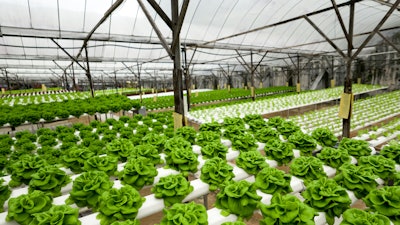 iStock
iStock
In addition to improving the productivity of existing land, the food sector is experimenting with novel ways of producing food. For instance, densely populated countries like Singapore, UAE and Qatar which lack natural resources like agricultural land, are considering indoor farming methods like vertical farms to grow food. Vertical farming is a type of indoor farming technique that requires limited or no pesticides. This technology includes entirely insulated indoor operations, often producing crops on multiple levels using electrical lighting, like light-emitting diodes (LEDs). However, critics doubt the profitability of these farms. Vertical farms require high initial investments as well as high running costs. Studies reveal that the initial investment to cultivate a vertical farm is ten times that required by greenhouses.
Concerns around food safety and sustainability are making transparency within the entire food supply chain, from farm to fork, indispensable. Businesses are increasingly deploying blockchain technology, which can enable real-time end-to-end traceability of the food supply chain, to meet these objectives. Deploying blockchain at a larger scale by all players can equip each one to track all the activities in a supply chain by reviewing the status of each transaction, identifying errors and holding counterparties accountable for their actions. However, a successful deployment of blockchain relies on the universal adoption by all players, from farmers to retailers, which is challenging in a diverse and multifaceted food supply chain. Consistent industry standards and a strong regulatory framework could encourage a ubiquitous adoption of this technology in the food supply chain
 iStock
iStock
More recently, alternative proteins which include both plant-based meat and cultured or lab-grown meat, offer new sustainable ways of meat production. While the vegan population was higher in Asia (13%) compared to Europe (4%) in 2020, this trend is likely to reverse going forward. In Asia, a growing population combined with rising incomes are expected to drive higher demand for meat and seafood consumption, estimated to rise by 78% between 2017 and 2050. Meat products account for a majority of greenhouse gases (around 60%) in the food sector. Alternative proteins can help to manage this rising meat demand in the region in a sustainable manner.
Western countries are seeing a more positive consumer movement towards artificial proteins. Both Europe and America are expected to reach “peak meat” by 2025, at which point consumption of conventional meat starts to fall, a result of fast growth of plant-based alternatives to animal products. However, the artificial proteins particularly cultured meat faces regulatory challenges which could impede its growth. Singapore and Qatar are the only countries in the world to have given regulatory approval to cultured or lab-grown meat. More R&D is also needed to support scalability of this sector as the infrastructure required to make these products at scale still doesn’t exist.
Personalized diets and nutrition is another trend that is gaining popularity rapidly as the scientific community reveals that people’s bodies react differently to the same types of food. A 2020 global consumer survey found that personalized nutrition is an important consideration for 64% of consumers when purchasing products. Some startups are using samples of body fluids and continuous monitoring devices to track blood levels of glucose, vitamins etc. Others are deploying 3D technology to produce mathematically optimized meals with precise amounts of ingredients tailored to consumer needs. AI-driven mobile applications are creating create personalized diet plans based on different types of genetic, health and related data.
While emerging technologies offer solutions for many challenges across the agriculture and food value chain, there are many challenges to large-scale deployment of technologies. Different stakeholders in the sector, from policymakers to farmers and private sector players, will have to work together by designing supportive regulations, encouraging innovation in the sector and incentivizing the adoption of these technologies.
 Ritu Bhandari
Ritu Bhandari


